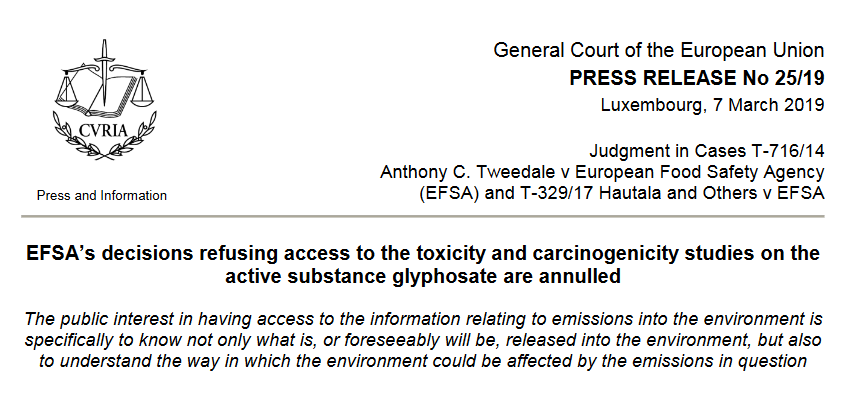
Greens/EFA, 7 March 2019 | Source
Today the European Court of Justice has ruled that the European Food Safety Authority (EFSA) must publish all studies around the cancer risks of glyphosate. The Court agreed with the Greens/EFA arguments that there is an overriding public interest in transparency, which outweighs Monsanto, Cheminova and others‘ claims that the studies on cancer risks used for the authorisation of glyphosate could not be made public in order to protect their commercial interests.
In the Greens/EFA v EFSA, Monsanto and Cheminova case, Heidi Hautala (Finland), Michèle Rivasi (France), Benedek Jávor (Hungary) and Bart Staes (Belgium) complained in May 2017 on behalf of the group for the publication of documents on the authorisation of pesticides. The European Food Safety Authority had previously stated that it had classified glyphosate as non-carcinogenic on the basis of unpublished studies, including by Monsanto.
Bart Staes, Greens/EFA rapporteur on the Special Committee on the authorisation pesticides, comments:
„Today’s ruling is a victory in the fight against secrecy when it comes to the environmental and health risks of dangerous products such as glyphosate. From now on, the public and independent scientists will be able to see how chemical giants write their own reports on the safety of their products for authorisation. Thanks to publication of all available studies in the future independent scientists with be able to double-check the science behind the assessments of pesticides. It’s vital that we have a regulatory system that works in the interest of human health, biodiversity and the environment and not for corporate profit.“
Heidi Hautala, transparency spokesperson for the Greens/EFA group, added:
„The ruling is a milestone and a victory for all those who advocate greater transparency in the way EU decisions are taken. The judges have made clear that secrecy to protect commercial interests is not justified in this case. EFSA must now publish the reports written by the chemical giants on the toxicity of their products so that scientists and the public can assess the dangers that these pesticides pose to human health and the environment.“
Also read: ECJ Press Release
